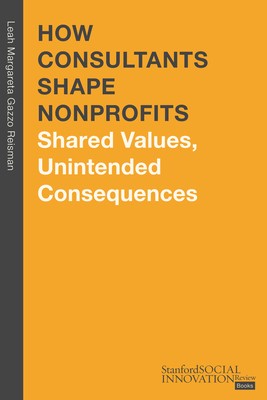
- We will send in 10–14 business days.
- Author: Leah Margareta Gazzo Reisman
- Publisher: STANFORD BUSINESS BOOKS
- ISBN-10: 1503635368
- ISBN-13: 9781503635364
- Format: 14.8 x 23 x 2.8 cm, kieti viršeliai
- Language: English
- SAVE -10% with code: EXTRA
Reviews
Description
The nonprofit sector leans heavily on consultants to guide strategic planning, advise on fundraising strategy, gather data on program effectiveness and more. Despite suspicion from some quarters about the quality and impact of consultants' work for nonprofits, Dr. Leah Reisman's extensive research demonstrates that most consultants work diligently to customize solutions for their clients and intervene, in both pressing and perennial issues facing the nonprofit sector. However there are overlooked costs. How Consultants Shape Nonprofits explores how consultants reinforce status-quo practices and ideas while prioritizing the opinions of people in power (nonprofit funders, leaders, etc.) over those of lower-level staff and communities. In doing so, consultants inadvertently reinforce problematic power dynamics and hierarchies, and leave some of the most pernicious problems in the nonprofit sector unaddressed. The book's important conclusions about the foundational, problematic role of consultants in supporting the nonprofit world are based on more than a year of ethnographic research and nearly 200 interviews with practitioners. Dr. Reisman offers guidance on how consultants, nonprofit leaders, and donors can better collaborate, and overcome traditional "blind spots" in the nonprofit-consultant relationship.
EXTRA 10 % discount with code: EXTRA
The promotion ends in 22d.17:53:44
The discount code is valid when purchasing from 10 €. Discounts do not stack.
- Author: Leah Margareta Gazzo Reisman
- Publisher: STANFORD BUSINESS BOOKS
- ISBN-10: 1503635368
- ISBN-13: 9781503635364
- Format: 14.8 x 23 x 2.8 cm, kieti viršeliai
- Language: English English
The nonprofit sector leans heavily on consultants to guide strategic planning, advise on fundraising strategy, gather data on program effectiveness and more. Despite suspicion from some quarters about the quality and impact of consultants' work for nonprofits, Dr. Leah Reisman's extensive research demonstrates that most consultants work diligently to customize solutions for their clients and intervene, in both pressing and perennial issues facing the nonprofit sector. However there are overlooked costs. How Consultants Shape Nonprofits explores how consultants reinforce status-quo practices and ideas while prioritizing the opinions of people in power (nonprofit funders, leaders, etc.) over those of lower-level staff and communities. In doing so, consultants inadvertently reinforce problematic power dynamics and hierarchies, and leave some of the most pernicious problems in the nonprofit sector unaddressed. The book's important conclusions about the foundational, problematic role of consultants in supporting the nonprofit world are based on more than a year of ethnographic research and nearly 200 interviews with practitioners. Dr. Reisman offers guidance on how consultants, nonprofit leaders, and donors can better collaborate, and overcome traditional "blind spots" in the nonprofit-consultant relationship.


Reviews